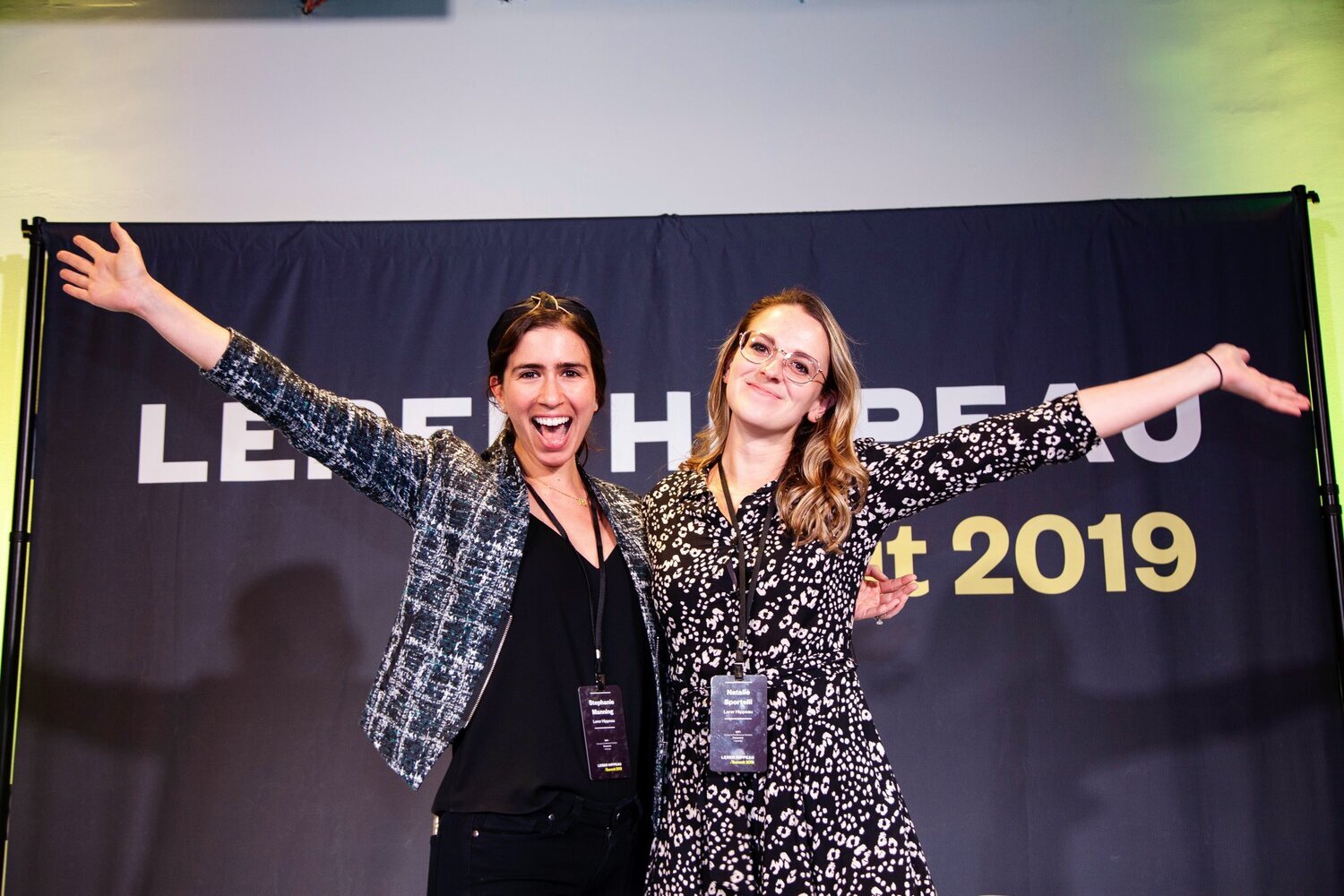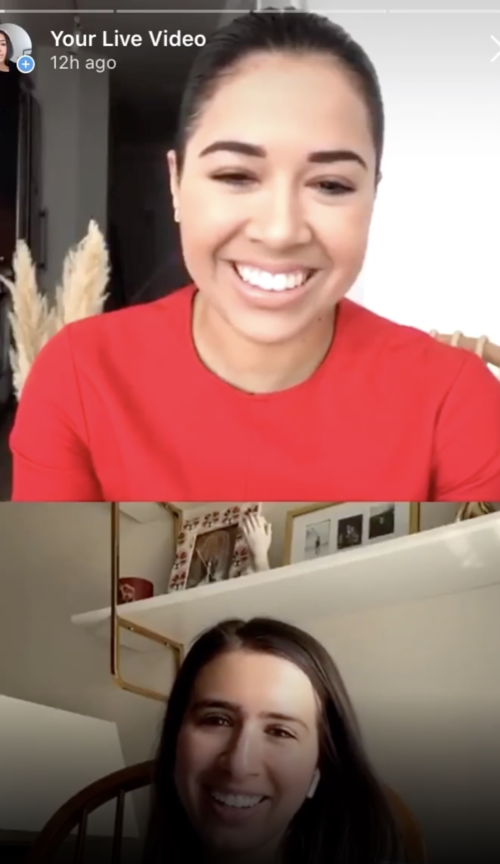She's the VC Operator Changing the Platform Game: Lerer Hippeau's Stephanie Cohen
The heroes behind the scenes of venture capital support “platform” - a relatively new title in the world of tech, finance, and business. One woman changing the meaning to the name is Stephanie Manning Cohen who’s the Head of Platform at Lerer Hippeau - one of New York’s most impressive early stage VCs. The Corporate Diary and Kat Garcia sit down via Instagram LIVE to chat.
Meet Stephanie Manning Cohen
Head of Platform at Lerer Hippeau, Stephanie Manning Cohen, sits down with Kat Garcia on The Corporate Diary
Note, this interview took place in April, 2020 in the early stages of COVID-19 in New York City.
Head of Platform at Lerer Hippeau joins The Corporate Diary to discuss the 400+ founders she supports. Some ventures include the likes of Glossier, Casper, Allbirds, Mirror, and Soylent.
Stephanie is Lerer Hippeau's Director of Platform, works closely with founders to forge community and connections across their portfolio and within the broader New York tech ecosystem. Before joining, Stephanie led talent, events, and community for enterprise tech venture capital firm Work-Bench. She started her career at AppNexus, where she worked on the talent acquisition team and helped grow the company from 300 to 1100 employees.
The Interview
Venture Capital remains a mysterious yet intriguing line of work. Most people think about investors but operators play an equally important role. Can you describe what you do as the Head of Platform and tell us about your team?
Of course! My team offers the tools and relationships that companies need to build and scale their brands. So what that means is we've bucketed it into about five areas. I've hired two amazing women on my team to oversee two of those areas respectively.
There’s Marketing & Communications that Natalie on my team oversees - everything from thinking about the Lerer Hippeau brand, and our PR and Comms strategy but also working with our companies on their brand and their launch.
There's also Talent. So how do we help our companies think about hiring and retaining top talent. Amanda from my team oversees that.
And then we also work on the third bucket which is Networking & Community. I like to say our team is a team of dot connectors. It's not our job to know the answer to every question but to know who does, so really building that network to introduce our founders to really anyone they need to know to scale their business from seed to series A and series A and beyond.
We run a ton of events for our founders. You’ve mentioned a few of our companies Glossier, Casper, Cotopaxi…We actually have about 250 active portfolio companies and with that comes about 400 founders. So bringing those folks together that just like pure magic happens when you bring people who are facing similar challenges people who can mentor and coach each other. So lots of great events go on about one per week, and we've definitely shifted to a more digital online strategy in light of COVID. And then the last bucket is just General Portfolio Resources. So that's everything from vendor discounts to our vendor database to any best practices playbooks that we've put together. That's how I like to think of my role and then also also my team.
Wow, incredible! There must be many challenges with your role, on top of those that founders are facing with COVID-19. As you support 400+ founders, what can you tell us about their current obstacles?
Yeah, I think right now is a really, really trying time for entrepreneurs and companies I mean we just saw that unemployment hit about 20 million yesterday and I think that's actually underestimation, because I think a lot of the unemployment claims haven't been filed. Unfortunately we’re likely going to see a lot more. In terms of challenges, I think first and foremost venture-backed companies are looking to conserve cash in any way they can. The first step to that was unfortunately laying off or furloughing a really large number of employees. Obviously based on the size of the company and how many employees you had beforehand, the strategy will differ but many founders had to make that really tough and difficult decision, and no one likes to do that. It’s something that was really weighing on a lot of founders so that was probably one of the biggest challenges that I saw founders facing early on in this.
After you go through your layoffs and furloughs, a lot of founders are think: “Okay, how else can I conserve cash or how else can I get cash in if my sales are down and if my revenue is impacted by this”. We're seeing revenue impact about 90% of the portfolio. The remaining 10% of companies not seeing revenue impact were assumed to do well in this environment. For instance, telehealth companies or digital health companies like Mirror that provides an in-home gym. I know my husband and I were super grateful that we had our Peloton before all of this happened!
Stephanie Manning Cohen at the Lerer Hippeau Summit in 2019
“My mentor told me to take a deep breath. The VC industry usually lags about 9 to 12 months behind the market so I think we’re actually going to see a lot of the ramifications and changes probably towards the end of the year. Something we’ll see in the broader market is, how consumer behavior is going to shift and who is going to build companies around that.”
— Stephanie Manning Cohen, Lerer Hippeau
I think companies are also really facing a challenge with, “how do I talk about my business?” We've all seen our inboxes just blow up with emails. You don't want to be predatory in this type of environment. Companies want to make sure that they're coming off as authentic and true to themselves, but also realizing that it's not business as usual.
Then I'd say the last bucket is just fundraising. I think that yes VC’s are open for business but the last couple weeks have been laser focused on helping their current portfolio companies versus deploying more money. I do think we've seen a lot of companies get creative with “okay if I need new cash to come in, instead of raising a new round maybe I'll open my old round / previous round again”. We’ve seen that actually work pretty well for some companies which I think is a nice tip and something to think about if you're looking to raise additional money but are having trouble raising a new round.
You worked in talent and have extensive experience in building teams. You started out in tech where you grew a team from 300 to 1,100! From talent and hiring in the startup world, what led you to VC?
I joined AppNexus right out of school which is the talent acquisition role you're referring to, and at the time they were a 300 person startup. It’s true that by the time I left we grew to 1100 people, so I think that really gave me a front row seat in terms of startup growing pains and what happens when you go from a startup to basically a mid-sized company. My experience there really taught me to be a people-first operator how important people were to an organization, whether it was kind of subject matter expertise, leadership/management or product growth.
I really think I got that great experience there. I didn't know what I wanted to do next but I actually stumbled upon a posting at WorkBench which is an enterprise tech VC firm. The general partner who hired me there pulled up my cold email that I sent to her back in 2015 when I was looking for a new role. It was all about community building within the workbench portfolio, communications and program management, and there was also a talent piece. Lerer Hippeau reached out to me shortly thereafter, and they were like “Hey, we want to hire you for this role, we love what you're doing at WorkBench. And I think we need you.” So, I jumped ship and joined the team there. This platform role has a ton of similarities between talent acquisition and especially campus recruiting with a program management piece. There’s also hiring and talent and the community building part due to the interns we work with. The exception in the platform role is that you’re working with founders and executives at startups.
My start in tech set me up nicely for this job but it wasn't so black and white nor crystal clear that VC was something that I would end up in. It’s not something that I necessarily was looking to do I actually kind of just fell into it!
Lerer Hippeau has great gender diversity across the board and it’s not something you often see in the world of venture capital. The space is actually incredibly male dominated both from a founder and investor perspective. What can you tell us about Lerer Hippeau’s continuous support for women in VC?
There's been huge initiatives to get more women into investing roles. Lerer Hippeau has prioritized it. We've empowered women on the team and to your point, we do have great gender diversity on the team. At the end of the day, that kind of diversity leads to better business outcomes so it's not just like a check the box thing it's, it's actually a good business decision.
Stephanie, to send us off, what is the change you’d like to see in the world for women (or by women)?
I really want to see more women at the very top in decision making positions. It was interesting to see the image showcasing the countries who have female leaders and how they're doing better in light of this pandemic.
Women feel a greater sense of inclusivity and belonging when there are more people who look like them at the very top. That goes for any type of diversity.
I also, I hope all women know that it's not a zero sum game and there's not only one position for women. We can rise together. The more we help each other, and the more we push each other to succeed (help get each other in positions of power), the better everyone will do.
Check out the YouTube interview video below.















Growth Architects are the jack of all trades. Terminal’s Director of Growth knows this all too well. She’s the woman who, once upon a time, was responsible for Vine’s growth, and entered the world of VC.